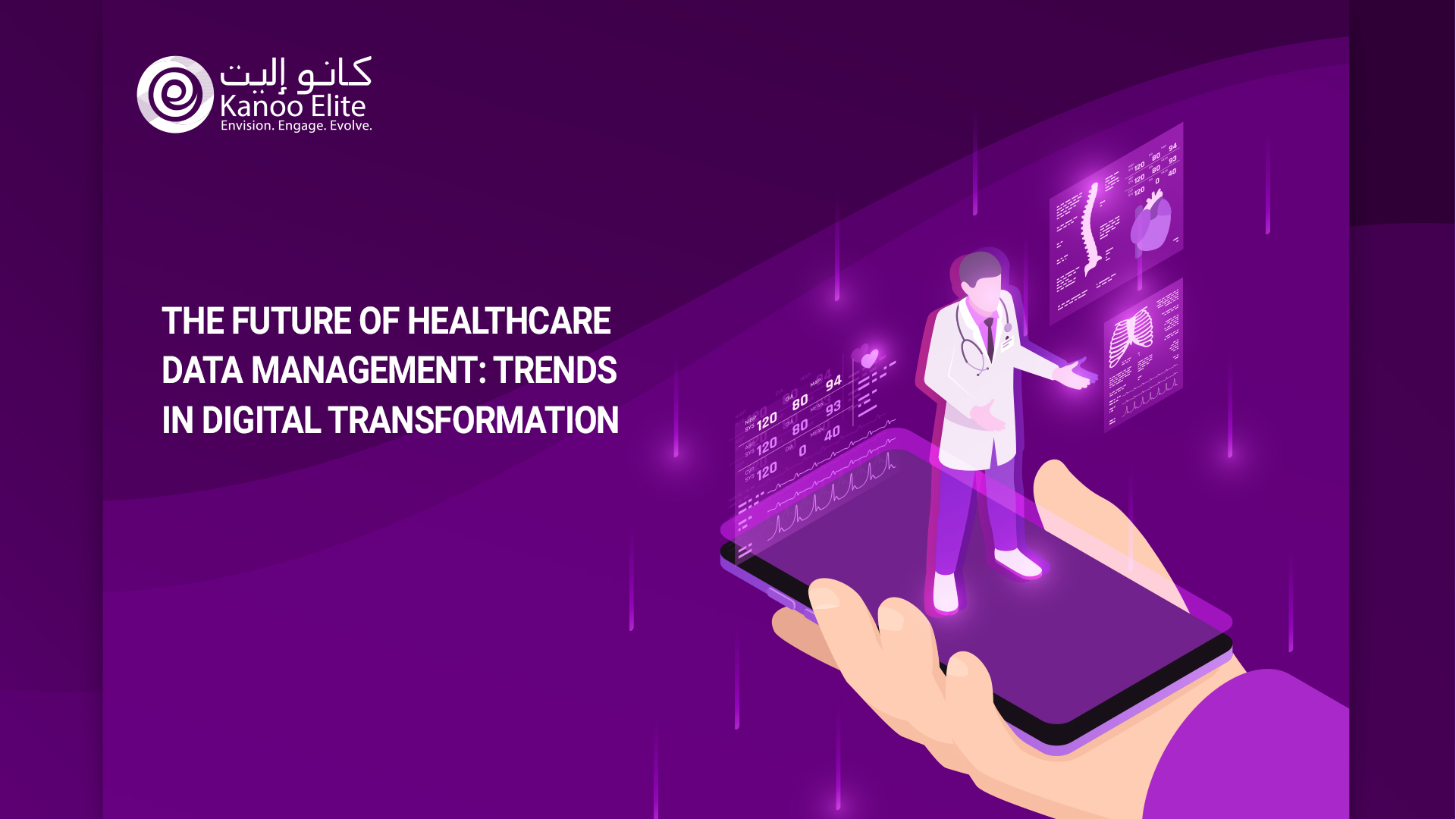In the rapidly evolving landscape of healthcare, data management has emerged as a critical area of focus. The digital transformation sweeping across the industry is reshaping how healthcare organizations manage, store, and utilize data. As healthcare becomes more data-driven, the future of healthcare data management will be defined by several key trends, including the adoption of cloud-based solutions, the integration of artificial intelligence (AI) and machine learning (ML), the rise of interoperability, the emphasis on data security and privacy, and the growing role of patient-centered data management.
1. Cloud-Based Solutions: The Foundation of Modern Healthcare Data Management
Cloud computing is at the forefront of the digital transformation in healthcare. As healthcare organizations generate massive amounts of data from electronic health records (EHRs), wearable devices, and other sources, the need for scalable, secure, and cost-effective storage solutions has become paramount. Cloud-based solutions offer a flexible and reliable platform for storing and managing healthcare data.
The advantages of cloud computing in healthcare are manifold. Cloud solutions enable seamless data access across different departments and locations, facilitating collaboration among healthcare providers. This is particularly important in the context of telemedicine, where remote access to patient data is crucial for providing timely and effective care. Moreover, cloud-based systems can easily scale to accommodate the growing volume of healthcare data, ensuring that organizations can keep pace with the increasing demands of data storage and processing.
In the future, we can expect to see a broader adoption of hybrid cloud models, where healthcare organizations combine public and private cloud environments to optimize data management. This approach allows organizations to balance the need for data security and compliance with the benefits of scalability and cost efficiency. As cloud technology continues to evolve, it will play an even more significant role in the digital transformation of healthcare data management.
2. Artificial Intelligence and Machine Learning: Revolutionizing Data Analytics
Artificial intelligence (AI) and machine learning (ML) are set to revolutionize healthcare data management by enabling advanced data analytics and decision-making. AI-driven tools can analyze vast amounts of healthcare data to identify patterns, predict outcomes, and support clinical decision-making. This capability is particularly valuable in the context of precision medicine, where personalized treatment plans are developed based on a patient’s genetic makeup, lifestyle, and medical history.
Machine learning algorithms can also be used to improve the accuracy of diagnostic tools, reduce the likelihood of medical errors, and enhance patient outcomes. For example, AI-powered diagnostic tools can analyze medical images to detect early signs of diseases such as cancer, leading to earlier interventions and better patient prognosis. Additionally, AI can help healthcare organizations optimize their operations by predicting patient admission rates, managing resource allocation, and streamlining administrative processes.
As AI and ML technologies continue to advance, their integration into healthcare data management will become more widespread. However, it is essential to address the ethical and regulatory challenges associated with AI in healthcare, particularly concerning data privacy and bias in algorithmic decision-making. Ensuring that AI-driven solutions are transparent, accountable, and aligned with ethical standards will be crucial for their successful implementation.
3. Interoperability: Bridging the Gap Between Systems
Interoperability, or the ability of different healthcare systems and applications to exchange and use data, is a key trend shaping the future of healthcare data management. The lack of interoperability has long been a barrier to efficient data sharing and collaboration in healthcare. However, the push for standardized data formats and protocols, such as the Fast Healthcare Interoperability Resources (FHIR) standard, is helping to break down these barriers.
With improved interoperability, healthcare providers can access and share patient data across different systems and platforms, leading to more coordinated and comprehensive care. For example, a patient’s medical history, lab results, and imaging studies can be seamlessly integrated into a single EHR, providing clinicians with a complete picture of the patient’s health status. This holistic approach to data management not only improves patient outcomes but also reduces the risk of duplicate tests and procedures, leading to cost savings for both patients and healthcare organizations.
In the coming years, we can expect to see further advancements in interoperability, driven by regulatory initiatives and technological innovations. The widespread adoption of APIs (Application Programming Interfaces) will facilitate real-time data exchange between different healthcare systems, enabling more efficient and effective care delivery. As interoperability becomes the norm, healthcare organizations will be better equipped to harness the full potential of their data.
4. Data Security and Privacy: Safeguarding Sensitive Information
As healthcare data becomes increasingly digitized, ensuring its security and privacy is more critical than ever. The healthcare industry is a prime target for cyberattacks due to the sensitive nature of the data it handles. Breaches of healthcare data can have severe consequences, including identity theft, financial loss, and compromised patient care.
To protect healthcare data, organizations must implement robust cybersecurity measures, such as encryption, multi-factor authentication, and regular security audits. Additionally, compliance with data protection regulations, such as the Health Insurance Portability and Accountability Act (HIPAA) in the United States and the General Data Protection Regulation (GDPR) in Europe, is essential for safeguarding patient information.
The future of healthcare data management will likely see the adoption of advanced security technologies, such as blockchain, to enhance data integrity and transparency. Blockchain’s decentralized and immutable nature makes it an ideal solution for securing healthcare data, as it ensures that data cannot be tampered with or altered without detection. Moreover, blockchain can provide patients with greater control over their data, allowing them to grant or revoke access to their information as needed.
5. Patient-Centered Data Management: Empowering Individuals
The shift towards patient-centered care is driving changes in how healthcare data is managed. Patients are increasingly taking an active role in managing their health, and this trend is reflected in the growing demand for patient-centered data management solutions. These solutions enable patients to access, control, and share their health data with healthcare providers, leading to more personalized and informed care.
One of the key enablers of patient-centered data management is the rise of mobile health (mHealth) apps and wearable devices. These tools allow patients to track their health metrics, such as heart rate, blood pressure, and physical activity, in real time. The data collected by these devices can be integrated with EHRs, providing healthcare providers with valuable insights into a patient’s health status and enabling more proactive care.
In the future, we can expect to see the development of more sophisticated patient portals and apps that offer enhanced functionality, such as telemedicine services, medication reminders, and personalized health recommendations. Additionally, the use of AI and ML in patient-centered data management will enable more accurate and timely interventions, further improving patient outcomes.
6. The Role of Big Data in Healthcare Research and Population Health Management
Big data is playing an increasingly important role in healthcare research and population health management. The ability to analyze large datasets allows researchers to identify trends, uncover correlations, and develop new treatment strategies. For example, big data analytics can be used to study the effectiveness of different treatments, monitor the spread of infectious diseases, and assess the impact of public health interventions.
In population health management, big data enables healthcare providers to identify at-risk populations, predict disease outbreaks, and develop targeted prevention strategies. By analyzing data from multiple sources, such as EHRs, social determinants of health, and environmental factors, healthcare organizations can gain a comprehensive understanding of the factors influencing population health. This information can be used to design more effective public health programs and allocate resources more efficiently.
As the volume of healthcare data continues to grow, the importance of big data in healthcare research and population health management will only increase. However, it is essential to address the challenges associated with big data, such as data quality, interoperability, and the ethical use of data. Ensuring that big data analytics are conducted in a responsible and transparent manner will be crucial for realizing their full potential in healthcare.
Conclusion
The future of healthcare data management is being shaped by the ongoing digital transformation of the industry. Cloud-based solutions, AI and ML, interoperability, data security, patient-centered data management, and big data are all key trends that will define how healthcare organizations manage and utilize data in the years to come. By embracing these trends, healthcare organizations can enhance the quality of care, improve patient outcomes, and drive innovation in the industry. However, it is essential to address the challenges associated with these technologies, particularly concerning data privacy, security, and ethical considerations. As the healthcare landscape continues to evolve, the effective management of healthcare data will be crucial for delivering high-quality, patient-centered care in the digital age.



